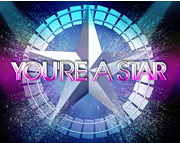
The Eurovision Song Contest 1981 was the 26th edition of the annual Eurovision Song Contest. It took place in Dublin, Ireland, following the country's victory at the 1980 contest with the song "What's Another Year" by Johnny Logan. Organised by the European Broadcasting Union (EBU) and host broadcaster Radio Telefís Éireann (RTÉ), the contest was held at the RDS Simmonscourt on 4 April 1981, and was hosted by Irish television journalist Doireann Ní Bhriain.

You're a Star is an Irish music competition series broadcast by RTÉ One from 2002 to 2008. Produced by the broadcaster and Screentime ShinAwiL, the series was similar to formats such as Idol and The X Factor.

Eurovision: You Decide is the most recent name of a BBC television programme that was broadcast annually to select the United Kingdom's entry for the Eurovision Song Contest. The show had previously gone under several other names, including Festival of British Popular Songs (1957), Eurovision Song Contest British Final (1959–1960), The Great British Song Contest (1996–1999), Eurovision: Making Your Mind Up (2004–2007), Eurovision: Your Decision (2008), and Eurovision: Your Country Needs You (2009–2010), but was known, for most of its history, as A Song for Europe.

Niamh Kavanagh is an Irish singer who sang the winning entry at the Eurovision Song Contest 1993.

Ireland has participated in the Eurovision Song Contest 56 times since making its debut at the 1965 contest in Naples, missing only two contests since, in 1983 and 2002. The contest's final is broadcast in Ireland on RTÉ One. Ireland shares a joint record total of seven wins with Sweden, and is the only country to have won three times consecutively.

"What's Another Year" is a song recorded by Irish singer Johnny Logan which was his first Eurovision Song Contest winning song, achieving success in the 1980 edition of the contest, as well as Ireland's second Eurovision victory. Composed by Shay Healy, the song reached number one on the UK Singles Chart for two weeks in May.
Sweet Dreams was a British vocal trio composed of Carrie Gray, Helen Kray and Bobby McVay. This teen trio represented the UK in the Eurovision Song Contest 1983 with the song "I'm Never Giving Up".
Maxi is a former musician and radio presenter in the Republic of Ireland. Maxi performed with two girl groups and the Irish supergroup The Concerned in the 1970s–80s, also representing Ireland at the 1973 and 1981 Eurovision Song Contests. After an automobile accident left her hospitalized, she focused on becoming a presenter for RTÉ; she retired from the broadcaster in 2015 after 30 years.
Maxi, Dick and Twink were an all-girl singing trio in Ireland in the late 1960s and early 1970s. Maxi is Irene McCoubrey, Dick is Barbara Dixon and Twink is Adele King.
Sheeba were an all-girl pop trio popular in Ireland in the late 1970s and early 1980s. They were Maxi, Marion Fossett and Frances Campbell. They are best known for representing the host nation, Ireland, in the Eurovision Song Contest in 1981 with "Horoscopes".
After winning the 1992 and 1993 contests with female soloists, Ireland selected Paul Harrington and Charlie McGettigan to represent them in 1994.
Thanks to Johnny Logan's win in Brussels in 1987, the 1988 Eurovision Song Contest was to be held in Dublin. The song "Take Him Home", written and composed by Peter Eades and performed by Jump The Gun was chosen to represent Ireland after winning the national final selection.
Ireland participated in the Eurovision Song Contest 2003 with the song "We've Got the World" written by Martin Brannigan and Keith Molloy. The song was performed by Mickey Joe Harte. The Irish broadcaster Raidió Teilifís Éireann (RTÉ) returned to the Eurovision Song Contest after a one-year absence following their withdrawal in 2002 as one of the bottom six countries in the 2001 contest. The Irish entry for the 2003 contest in Riga, Latvia was selected through the music competition series You're a Star, organised by RTÉ. The competition consisted of 20 shows and concluded with a final, resulting in the selection of "We've Got the World" performed by Mickey Joe Harte as the Irish Eurovision entry after facing a public televote.
The Irish National Final was held on 14 March 1982 by RTÉ in Dublin, Ireland.
Ireland was represented by Linda Martin, with the Johnny Logan-penned song "Terminal 3", at the 1984 Eurovision Song Contest, which took place on 5 May in Luxembourg City. "Terminal 3" was chosen as the Irish entry at the national final on 31 March.
Ireland was represented by Maria Christian, with the song "Wait Until the Weekend Comes", at the 1985 Eurovision Song Contest, which took place on 4 May in Gothenburg, Sweden. "Wait Until the Weekend Comes" was chosen as the Irish entry at the national final on 27 March.
Ireland was represented by Colm C. T. Wilkinson, with the song "Born to Sing", at the 1978 Eurovision Song Contest, which took place on 22 April in Paris. "Born to Sing" was chosen as the Irish entry at the national final on 5 March.

Ryan O'Shaughnessy is an Irish singer and former actor from Loughshinny, Skerries, Dublin. He portrayed Mark Halpin in the popular TV series Fair City for nine years (2001–2010). In January 2012, he appeared in the inaugurative season of The Voice of Ireland and in May 2012, he took part in sixth series of Britain's Got Talent making it to the final and finishing in fifth place. He represented Ireland in the Eurovision Song Contest 2018 with the song "Together" finishing 16th.
The Duskeys was an Irish family pop group, known for their participation in the Eurovision Song Contest 1982 with the song "Here Today Gone Tomorrow".
Yugoslavia was present at the Eurovision Song Contest 1981, held in Dublin, Ireland, after last participating at the Eurovision Song Contest 1976 contest in The Hague, Netherlands.






